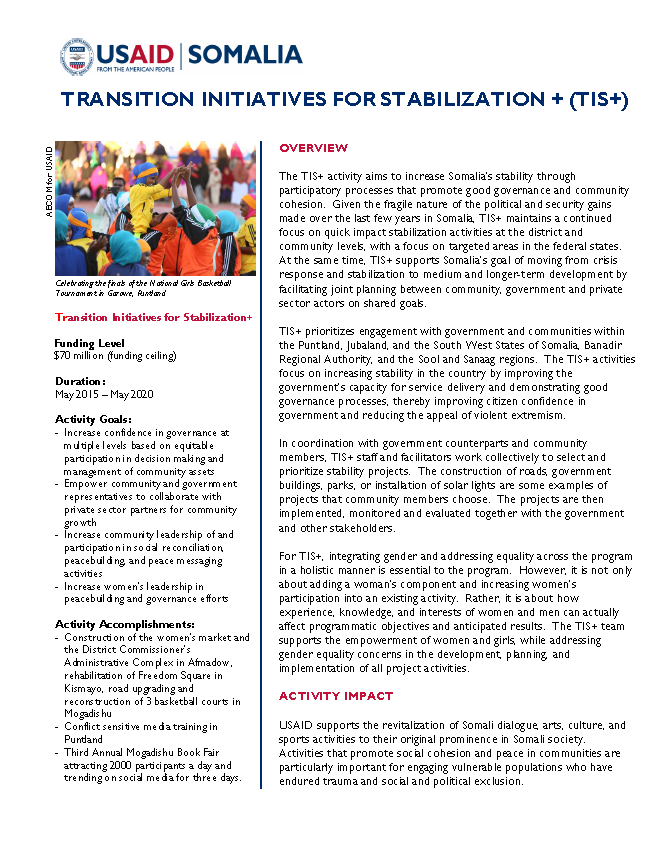Speeches Shim
Transition Initiatives for Stabilization + (TIS +) ![]() (pdf - 226k)
(pdf - 226k)
Overview
The persistence of extremist groups, like al-Shabaab, remains the greatest immediate threat to Somalia’s stability. Political and security gains over the last couple of years have resulted in modest progress against al-Shabaab influence in Somalia. For these gains to be consolidated, the underlying conditions that allow extremist groups to take root must be addressed. Governing institutions must become more inclusive and effective and exclusionary clan and patronage-based politics must be reduced.
Activity Areas
USAID launched the Transition Initiatives for Somalia Plus (TIS+) program in 2015 to reduce the conditions that allow extremist groups to thrive. TIS+ accomplishes this objective by:
-
Increasing the political and social inclusion of marginalized populations;
-
Strengthening community reconciliation processes; and
-
Expanding the government’s presence in areas recently under the control of al-Shabaab.
TIS+ works to move communities from crisis response and stabilization to medium and longer-term development by working with other USAID and donor projects to facilitate their entry into project areas.
TIS+ works in some of the most challenging and complex regions of Somalia. Given the fragile and dynamic nature of the environments where TIS+ works, TIS+ implements activities through a flexible small grant mechanism, that focuses on quick impact stabilization activities at the district and community levels.
Typical projects include facilitating inclusive dialogues between community leaders and local government officials to identify community needs or providing support to local peace committees to encourage reconciliation between clans. TIS+ also executes community-prioritized small infrastructure projects such as the rehabilitation of key roads to demonstrate the tangible benefits of being under government, as opposed to al-Shabaab, rule.
TIS+’s implementation approach emphasizes engagement between government entities and local residents, as well as community ownership. All TIS+ interventions are rooted in research and analysis of local conflict and clan dynamics.
Activity Impact
Restoring Stability in Vulnerable Communities
TIS+ has demonstrated that it can move quickly to restore stability in areas recently threatened by violent extremist organizations. For instance, an Islamic State affiliated group took control of the coastal town of Qandala in October 2016. The town was retaken later that year, but the town remained vulnerable to extremist groups due to its profound political and economic marginalization. TIS+ worked in partnership with state authorities bringing together a diverse body of community leaders and state and local government officials to identify priority social and economic reconstruction needs. In response, TIS+ completed the installation of solar street lights to improve security in the streets and the rehabilitation of a frankincense hangar, which has reinvigorated the industry and increased employment and income opportunities for the women in the community. The projects reinforced that the Somali state was responsive to the local communities and helped counter the feelings of disenfranchisement and neglect.
Similarly, after al-Shabaab (AS) destroyed the Hodan District administration complex in Mogadishu in September 2018, TIS+ supported the government to quickly reconstruct the complex immediately following the attack, demonstrating the government’s ability to quickly recover after an al-Shabaab disruption.
Reducing Local Conflict
USAID’s 2019 TIS+ evaluation found that there were a reduced number of conflicts over resources and a greater reliance on local leaders and structures to mediate conflicts in TIS+ target areas. TIS+ engages with actors in conflict on shared projects to build trust and build the foundation for greater reconciliation. In Galkayo, TIS+ worked with youth from the two rival clans to form the Joint Galkayo Youth Committee. The Committee began organizing small community activities such as a community clean-up, that built relationships and trust between the two sides. The Committee now engages with community leaders to encourage tolerance and serves as a platform for dialogue when issues within the community arise.
Promoting Sustainability and Self-Reliance
TIS+ has leveraged $4,576,138 in contributions from the government and the community in TIS+ projects. These contributions build ownership and buy-in from the communities, which is essential to maintenance of these projects once they are completed. TIS+’s focus on investing in human capital has also yielded tangible results. For example, TIS+ supported a mentoring program for a cadre of young engineers in the Jubaland government. The engineers in the mentorship program now serve as technicians in the Jubaland government making Jubaland less reliant on external technical expertise.


Comment
Make a general inquiry or suggest an improvement.